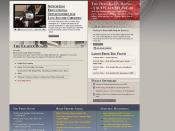AP US History 2
Origins of Democratic and Republican Separation
The political battles during the Gilded Age (1869-1889) were not fought with weapons and lives as was the Civil War directly before them, but with pamphlets, verbal accusations and national ideals. However, were the two most prominent foes vying due to differing economic policies, or were they similar parties that based their separation on national origin, geography, history, and emotion? The basic economic reforms were, in fact, similar, yet the varying ideologies and animosities that remained from prior eras enlarged the gap between Democrat and Republican.
After the Civil War, the general consensus of the American population was a yearning for unity (to some extreme), civil service reforms, the tariff, currency, and a prosperous America. The basic disagreement between the parties was on military reconstruction, which was over by 1877, less than halfway through the Age (502). Both Republicans and Democrats, however, wished for the general union of America - the majority of the Republicans (moderates) did not aim to punish the South through Military Reconstruction and the South, although angered, rose above their resentment and waited until 1877, when Northern troops pulled out and the South was left to govern itself (511).
Throughout the various presidencies, of which most were dominated by Republicans (save for Grover "the good" Cleveland), graft and dishonest means for achieving wealth were not uncommon within both parties, leading to the Panic of 1873 (506). Such a depression shed light upon the unscrupulous practices of many political figures, as well as debtors and other prominent businesspeople. This led to yet another national agreement - civil service reforms. Under the Presidency of Republican Chester Arthur, the Pendleton Act was passed in 1883. Considered the "Magna Carta of civil-service reform," it prohibited financial assessments on job-holders...


